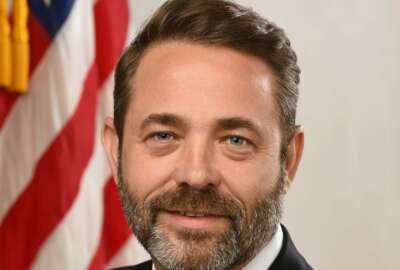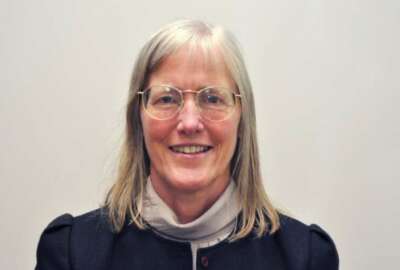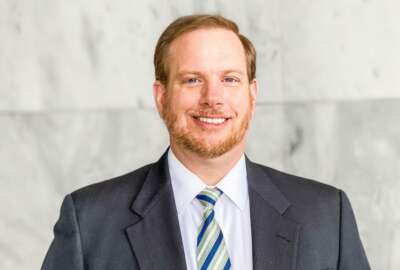
Sammies 2021 finalists announced for outstanding federal service
One good thing about the last year's seemingly endless crisis is the opportunity to render outstanding public service.
Best listening experience is on Chrome, Firefox or Safari. Subscribe to Federal Drive’s daily audio interviews on Apple Podcasts or PodcastOne.
One good thing about the last year’s seemingly endless crisis is the opportunity to render outstanding public service. And that’s what this year’s class of Service to America Medals finalists have done. Announced this week, many have risen to the challenge of the pandemic. For a review, the President and CEO of the Partnership for Public Service Max Stier joined Federal Drive with Tom Temin.
Interview transcript:
Tom Temin: Max, good to have you on.
Max Stier: A pleasure to be here.
Tom Temin: And of course, the Federal Employee Viewpoint scores are out this week, it’s Public Service Recognition Week, the president issued a proclamation saying sort of a tip of the hat to federal employees and public service employees in general. Kind of a red letter week, isn’t it?
Max Stier: Absolutely. Look, we have an unbelievable set of problems that we face. And our federal employees are the ones that are truly central to addressing them and they deserve recognition, and at least the one week of the year, where you get to say thank you on a consistent basis.
Tom Temin: Now, this year’s class of finalists aren’t entirely pandemic-related, but quite a few of them are, I think, probably more than you would normally get in the health area in a given year. Is that how it looks to you?
Max Stier: Yep, I mean, it’s impossible to overlook a once-in-a-lifetime-or-more health crisis, like the pandemic, and the federal workforce has really been central to addressing the issues across the board. So we actually created one special category for COVID-19 response, and they’re just amazing people. Everyone from Ian Brownlee and the team at Department of State that helped bring back 100,000 Americans who are stranded across the world, to Kizzmekia Corbett and Barney Graham at NIH, who are really responsible for the vaccines that are making so many of us safe from contracting the virus. So, it’s an extraordinary group of people. And they are, as you just said, doing both amazing work responding to the pandemic, as well as continuing to fight fires across the entire federal system on all kinds of issues that affect us even beyond the pandemic.
Tom Temin: And the thing we don’t realize too is that in responding to the pandemic, it takes many forms other than strictly health related, although it’s that also, as you mentioned, the folks responsible for the vaccine. But there’s also repatriation of Americans stranded abroad. Like you mentioned, Ian Brownlee and the team at the State Department did that one. There’s also the dispersion in a fair and fast manner of all those billions to help people with economic relief. So it’s really everything the government does is embodied in the response to the pandemic.
Max Stier: Absolutely. And, everyone else who is responding to all kinds of other urgent needs is doing it within the context of pandemic. So, whether it’s thinking about the astronauts going to the space station, or the Mars helicopter, or whatever else it might be, all the work of the government continues on, helping veterans, you name it, in addition to the normal challenges they’re all doing obviously in the context of the pandemic challenges.
Tom Temin: And there were a couple of census-related finalists this year. And I thought that was pretty fitting given the travails that the Census Bureau had. But it looks like ultimately, they got the right number from the right number of people in the right places.
Max Stier: Yes, absolutely. And one of the more, I think, extraordinary efforts was trying to address disinformation to ensure that census would actually — people would respond and not fall prey to bad information. So again, as you say, there just a extraordinary number of federal employees who are addressing, whether it’s weather related, or foreign policy challenges, or one of the stories that I find really powerful is those that are helping to ensure that people who are foster children aging out of system aren’t dropping out of the system and are getting the support that they need. It’s an incredible array of people helping Americans with critical problems.
Tom Temin: We’re speaking with Max Stier, president and CEO of the Partnership for Public Service. And in launching the program for this year, did you find that there was greater interest on people nominating other people, and also from the backers and sponsors that make it all possible? This was really a strange year for public service. Did that help the whole effort this year, do you think?
Max Stier: So, look, I think federal employees are the most modest group that I’ve ever encountered. And so I don’t think that finding these stories, there are a lot of them out there, but we still have to do a lot of work to identify them. And we really count on your listeners and others who find something great going on and letting us know. In terms of the support of the program, I will say that it is a constant struggle, and we’re keenly interested in any help that anyone can continue to give us partly right now because we’re actually doing two things. It’s really quite fun to see our — we now have a virtual program that we are doing and launching the finalists event and we’ll be doing a virtual film like we did last year, which was pretty awesome. And over 150,000 people watched it the first week, but we’re planning on trying to do that and an in-person event. It’s a bigger lift for us. So, the more support we can get the better.
Tom Temin: Yeah, that was right. Last year, it was a film and quite a few people did view it. In fact, you had sub-films. I remember the Nationals mascots, the racing presidents going to Anthony Fauci’s house to present him with [the Federal Employee of the Year] award. So, but you’re going to try to get in person again this year for the gala?
Max Stier: We will. I think, again, my bet is we will absolutely do the virtual event, the film again. And the reason why is that it just can reach so many more people than we can in an in-person event, but in-person event is also powerful. So, our hope is to have our cake and eat it, too. So, time will tell but we think that there’s a pretty good shot that we can do both.
Tom Temin: And just while we have you what’s your take on the Federal Employee Viewpoint scores from the macro level? They look pretty good, covering the prior year, when you had an administration, for better or for worse, was controversial, including among federal employees. What’s your interpretation of what’s going on there?
Max Stier: So my sense of this is, the first lesson I take from it is just, and perfect for Public Service Recognition Week is, federal employees are amazingly resilient. And I think what we see from those numbers is that despite the incredible challenges of trying to do difficult jobs in a pandemic, 60% of which people are doing it remotely, that people were getting the job done and getting it done well. And it’s a testament to the capability of the federal workforce to be innovative. And I think, just as a quick aside, I think this gives us real insight into the future of work for our federal government. If we’re thoughtful and intentional, we can actually build a better government based on the response to the pandemic. In terms of the overall engagement numbers, I think a lot of it has to do with the core reason why people are in the federal government is that they’re there to help, they’re mission-oriented people. And I think they saw, and we all saw, how central their work is to the health of our country and the health of our democracy. And I think that buoyed people, and I think a lot of the good numbers were related to that. I think you still see significant differentiation, depending on the capability of the leadership of the various organizations, the government. And that’s always been true, and I think will always be true. So, better leaders, more engaged employees, better outcomes for the American people. But I think the American public should feel very encouraged by the workforce that they have. We need to invest in it so that it’s there, not just now, but in the future. But, you know, we’re lucky to have what we got.
Tom Temin: And just a question on the partnership itself, you have had a pretty active program of research into various aspects of public service and mission delivery so forth, what’s on the agenda for the coming year?
Max Stier: We’re going gangbusters. For one, I would say my view is we’ve been a lemonade factory. We’ve actually, despite all the really significant challenges, have gotten better at pretty much everything that we do, and like the federal workforce have been very creative in doing it. So going forward, I’m excited about a lot of work we’re doing. So one really key strategy that we’ll be putting out shortly is a great approach about how we can refresh the federal workforce. So again, one of the core challenges for our government is that only 6% about of the federal workforce is under the age of 30. And that’s only 3% in IT, just as an example. And we have a strategy about how to deal with that, how to make sure we have the generational diversity we need now, which will also provide us workforce future strengths. So, that is very exciting to me. We’re doing a lot of work in the technology area, understanding that that’s such a fundamental enabler for good mission delivery in a place that the government is doing some great stuff that can do better across the board and learning from where they’re doing it well. So that’s exciting to me. We have a new effort trying to help Congress as an institution. And that, to me, is a big deal and a big part of the equation. So, the list is long, and we believe there’s a moment in time, right now, to make a bigger difference, and we want to make sure we make the most of that opportunity.
Tom Temin: Max Stier is president and CEO of the Partnership for Public Service. As always, thanks for joining me.
Max Stier: Thank you for your work.
Copyright © 2024 Federal News Network. All rights reserved. This website is not intended for users located within the European Economic Area.
Tom Temin is host of the Federal Drive and has been providing insight on federal technology and management issues for more than 30 years.
Follow @tteminWFED





